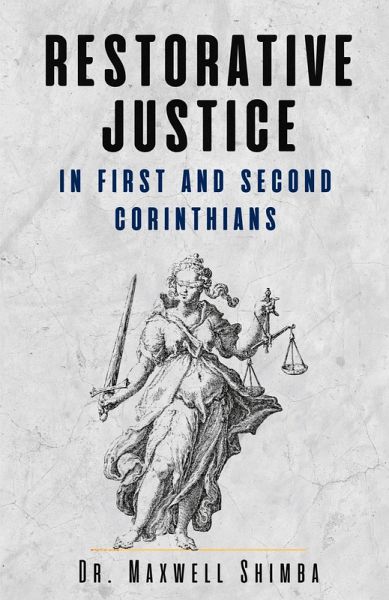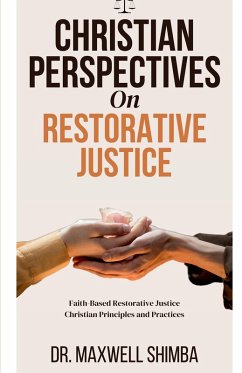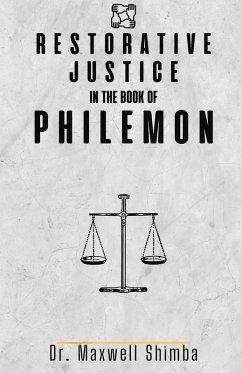
Restorative Justice in First and Second Corinthians
Versandkostenfrei!
Versandfertig in 1-2 Wochen
15,99 €
inkl. MwSt.

PAYBACK Punkte
8 °P sammeln!
Restorative Justice in First and Second Corinthians In "Restorative Justice in First and Second Corinthians," Dr. Maxwell Shimba provides a profound exploration of the apostle Paul's teachings on reconciliation and justice within the early Christian communities of Corinth. Drawing extensively from the biblical texts of 1st and 2nd Corinthians, Dr. Shimba elucidates how these epistles offer a framework for understanding and implementing restorative justice in both ecclesiastical and broader social contexts. The book emphasizes Paul's vision of a community that resolves conflicts internally thro...
Restorative Justice in First and Second Corinthians In "Restorative Justice in First and Second Corinthians," Dr. Maxwell Shimba provides a profound exploration of the apostle Paul's teachings on reconciliation and justice within the early Christian communities of Corinth. Drawing extensively from the biblical texts of 1st and 2nd Corinthians, Dr. Shimba elucidates how these epistles offer a framework for understanding and implementing restorative justice in both ecclesiastical and broader social contexts. The book emphasizes Paul's vision of a community that resolves conflicts internally through wisdom, grace, and mutual respect, reflecting the transformative power of the gospel. Dr. Shimba begins by setting the historical and cultural context of Corinth, a city known for its social diversity and moral complexities. He explains how these challenges influenced Paul's pastoral approach, particularly his insistence on resolving disputes within the church rather than seeking judgment from secular courts. By situating Paul's letters within this context, Dr. Shimba highlights the relevance of Paul's instructions for contemporary faith communities grappling with similar issues of division and conflict. One of the book's central themes is the contrast between retributive and restorative justice. Dr. Shimba carefully examines 1 Corinthians 6:1-11, where Paul criticizes believers for taking their disputes before non-Christian judges. He argues that Paul's model promotes a restorative approach that focuses on healing and reconciliation rather than punishment. This approach, according to Dr. Shimba, not only maintains the integrity and witness of the church but also fosters a more compassionate and effective means of conflict resolution. In his analysis of 2 Corinthians, Dr. Shimba delves into Paul's concept of the "ministry of reconciliation" (2 Corinthians 5:18-21). He explains how Paul views reconciliation as a fundamental aspect of the Christian mission, extending beyond personal relationships to encompass broader societal structures. Dr. Shimba's interpretation of this passage underscores the transformative potential of restorative justice, which seeks to restore broken relationships and promote peace and unity within the community. The book also addresses practical applications of restorative justice principles in modern church settings. Dr. Shimba offers guidelines for church leaders and members on implementing these principles in various aspects of church life, from handling interpersonal conflicts to addressing communal grievances. He emphasizes the importance of education, training, and the intentional discipleship of church members to foster a culture of reconciliation and restorative justice. Dr. Shimba's scholarship is complemented by his engaging writing style, which makes complex theological concepts accessible to a broad audience. He uses real-life examples and case studies to illustrate how restorative justice principles can be applied in contemporary contexts, making the book not only informative but also highly practical. His clear and compassionate voice invites readers to reflect deeply on their own practices and to consider how they can contribute to a more just and reconciled community. "Restorative Justice in First and Second Corinthians" is a valuable resource for pastors, church leaders, and laypersons interested in biblical approaches to conflict resolution and justice. Dr. Shimba's thorough exegesis and practical insights provide a robust framework for understanding and implementing restorative justice, making this book an essential addition to the field of Christian ethics and pastoral care. Through this work, Dr. Shimba challenges and inspires readers to embrace the transformative power of reconciliation, reflecting the heart of the gospel in their communities.














